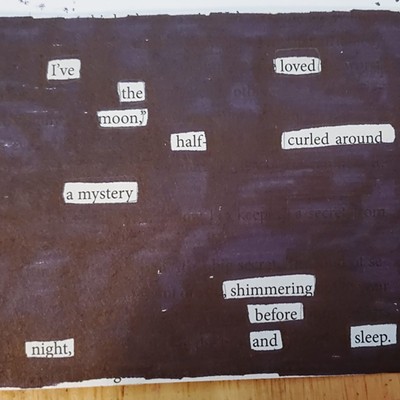Reader feedback 7.21.04
[
{
"name": "500x250 Ad",
"insertPoint": "5",
"component": "15667920",
"parentWrapperClass": "",
"requiredCountToDisplay": "1"
}
]
WXXI SHOULD MOVE BEYOND 'MERE SAFETY'
I appreciate that NPR's Morning Edition is relatively free of corporate, offend-no-sponsor censorship, but it is afflicted with a cautiousness and controversy-avoidance that allows only news and views that are safe and "mainstream." Part of WXXI's challenge is to be stimulating and thought-provoking as well as to provide material not covered by commercial stations.
It is clear to me that WXXI Radio could better fulfill its mission by including an award-winning and first-breaking-news program like Democracy Now! in its lineup.
The question is, will WXXI Radio respond to the community, or will it continue to claim objectivity, balance, and neutrality while airing Kurt Smith? I am personally optimistic that with enough listener input, WXXI Radio will find the courage to move beyond mere safety in its offerings.
John Keevert, Westfall Road, Brighton
While conservative politicians and the corporate media portray NPR as left-wing radio, analysis of programming shows this to patently false. In fact, studies by Fairness and Accuracy in Reporting, the media watchdog group, reveal just the opposite.
A 2003 FAIR study recording every on-air news source from NPR's four principle news programs (2,334 sources in 804 stories) shows that 64 percent of the sources were government officials, professional experts, or corporate representatives. Republicans outnumbered Democrats 61 percent to 38 percent, with third parties represented in only a single story during the entire month. Women were grossly under-represented --- a mere 21 percent of all sources, and a paltry 18 percent for political-issue stories.
In a second study of think tanks and commentators appearing on NPR, right-wing think tanks outnumbered those on the left more than 4 to 1, with women accounting for only 10 percent of all sources and people of color 3 percent.
A third study by FAIR, done in the week prior to the beginning of military actions in Iraq, looked at the three major networks and the Lehrer NewsHour for representation of viewpoints about the impending military action. Of more than 390 sources given voice, only three were anti-war.
Locally, WXXI is representative of this conservative slant. It airs business programming nightly (Marketplace) in a prime slot, while labor issues remain virtually invisible. It airs the conservative BBC Business News and conservative commentators but cannot see fit to bring Amy Goodman's Democracy Now! program to the airwaves, despite large community support.
The claim of NPR presidents past and present that NPR is the "voice of democracy" simply does not hold up under close scrutiny.
Greg Newton, Gregory Park, Rochester
WXXI should explain what it means to have "objectivity" in its news coverage and "neutrality" in its hosts. For example, WXXI's Morning Edition covered Secretary of State Powell's speech before the UN Security Council in February 2003. But the show's analysis simply repeated parts of Powell's presentation and discussed various points of emphasis. No critical viewpoints were presented, and no explanation was given as to why most of the international audience found Powell's argument unconvincing as a rationale for war.
In the months before Gulf War II, Morning Edition never interviewed or mentioned Scott Ritter, a prominent American weapons inspector who had worked in Iraq and publicly discredited many of the Bush Administration's claims justifying war.
When Jean-Bertrand Aristide was overthrown in Haiti last February, NPR joined the commercial media in reporting that Aristide had "fled" the country and "resigned," repeating verbatim the claims of the State Department. In fact, Morning Edition continued these characterizations for weeks, even as it recognized that a number of observers, including members of the US Congress, supported Aristide's claims that he was forced from the country in a coup abetted by the Bush administration.
In the past year, Democracy Now! has hosted individuals from every perspective and viewpoint on the Iraq occupation, from Defense Policy Board "neo-conservative" Richard Perle, to active-duty and retired soldiers and their families, to activists and independent journalists. Ms. Goodman's guiding principle is the "Fourth Estate" concept of classical liberalism, enshrined in our First Amendment. Simply put: journalists should act as a check against, rather than a mouthpiece of, political power.
Does "objectivity" require journalists to be mere stenographers and spokespersons for government and corporate leaders? Polls show that the American public is reevaluating the war in Iraq, and wondering how it could have been so misled on the existence of WMDs and meaningful links between Iraq and Al Qaeda. WXXI should follow other NPR (and PBS television) affiliates that are picking up Democracy Now!, and bring to its Rochester listeners a program that gives voice to all viewpoints.
Aaron Micheau, East Avenue, Rochester
To best serve a democracy, the media must represent us and help us hold those in power accountable. Mass communication has the power to reflect who we are. When our newspapers, radio, and television do not speak in a voice that resembles large segments our population, we must ask questions. As corporate interests trump our public interests, we must demand that we are heard.
The founding document for public broadcasting is the 1967 Carnegie Commission Report. It states that public broadcasting programming "should serve as a forum for controversy and debate, be diverse and provide a voice for groups that may otherwise be unheard." Instead of adhering to this worthy mission, NPR brands itself for a constituency of the white, educated, and elite.
Our request to WXXI officials: realize what an important role you could have in our community. As a locally owned public radio station, we ask that you recognize the diversity of this community, that you provide programs for our many points of view. We ask that you invigorate discussion and debate by pulling your head out of the sand and giving us programs that are daring and controversial.
Restore our faith that you are serving the public good rather than being in business to make money. While our limited air space has become saturated by the monolithic, corporate perspective of Clear Channel and Viacom, we expect more from you. Differentiate yourself by truly being public radio.
A good place to start is to air Democracy Now. By doing so, you would be respected as a local station that is responsive to its public. Your constituency would grow to include many outside of your current target audience.
Democracy Now's mission of going to "where the silence is" would help to fulfill your original mission by giving a voice to the working class, the disenfranchised, and dissenting voices that are rarely if ever heard on your current programming.
In the name of democracy, take a chance and try it for a year. If your corporate sponsors threaten to pull their funding, stand strong and remind them of the importance of public broadcasting of, for and by the people. Maybe you'll help them discover new marketing niches within our community.
Dawn Revette, Harlem Street, Rochester
A CLEAN SLATE FOR CITY SCHOOLS
The answer is almost always "more money." My hat is off to City Councilmembers Gladys Santiago and Lois Giess, among others, for not accepting that proposition as the only answer. Until all the various constituencies are ready to view the challenge with a clean slate, open to new ideas and approaches, the system will continue its decline of 40-plus years and stymie any possibility of long-term growth or improved city-home value.
Why does the school year require only 180 days of instruction? Can some classes actually be larger than average?
If the problem extends to the family, and many of the children come from poor families, shouldn't social services get involved in the schools?
With the relatively low cost of computers, should we consider providing computers at home for students at the fifth-grade level and above?
How can we justify a pay increase of 4-plus percent for employees (read, teachers) who are not performing and who have not offered any responsible solutions other than asking for more money and smaller class sizes?
Can we get employers to start a "bring your dad-mom-sis-guardian to school" day?
I'm sure that the brain trust in MonroeCounty can ask more and better questions --- as were posed by Heidi Zimmer-Meyer when asked about the possibility of bringing a casino to Rochester ("Big Gamble," June 23). The difference? People are talking, people are listening... no agendas, no recriminations.
Can someone take that same approach for the future of our children?
Bob Miglioratti, Highland Avenue, Rochester
LOOK OUT, PITTSFORD!
Regarding "Signs of the Times" (Metro Ink, June 16): Billboards can be kind of fun. I like analyzing them, trying to figure out where the ad agency is coming from in dreaming up the promotions. Sometimes they are quiet clever. More often than not, though, they are mundane and repetitious, hammering out the same old message: buy, buy, buy.
The City of Rochester has made valiant attempts to limit billboard placement. The current ordinances list several places where signs are prohibited: within Preservation Districts and within 100 feet of schools, churches, and parks, among others.
However, now we have roving advertisements, the Regional Transit Service being the worst offender. Once during the bus lineup downtown, I counted 10 buses with a local car dealer's face, logo, and automobiles wrapped all the way around the sides and back. So now advertisers can avoid the City's prohibitions and take their message to your neighborhood --- in fact, right to your doorstep.
To make matters worse, riding in these buses is like being in a shipping container. Sure, there are little pinholes where the windows are, to let the passengers know whether it's daytime or nighttime. Looking outside during the day, you see shadow figures, and shadow cars, and shadow landscapes. They've taken the fun out of riding a bus. Passengers sit inside these vaults in semi-darkness.
Now we are to going to be subjected to more entrepreneurship. We have billboard-size ads attached to the back of "trucks," illuminated from within and directed to various strategic locations by global positioning systems. Cool!
Are you ready Pittsford? You may be next.
Brian Peterson, Rochester
BUS STATION'S NO SALVATION
Today, the supporters of Renaissance Square argue that it will be the savior of our dormant downtown, and particularly that an opulent, single-use bus terminal is the key to the project's success. It seems to be a project that politicians love, as they plan to spend millions of our taxpayer dollars and hold numerous press conferences to announce how concerned they are about reviving Downtown Rochester.
These are the same politicians who cannot pass a state budget on time, who cannot lower New York's tax burden on businesses and residents, who cannot lower the price of gasoline, who cannot halt the exodus of jobs and people from the area, and who talk continuously about the need to keep young people in Rochester but don't seem to know what will keep them here.
Most young people I know do not take a bus and will not use a bus terminal. And those who live downtown would like everyday services such as a supermarket and more shopping and restaurants, along with good jobs they can easily commute or walk to.
If you buy the bus terminal as the key to reviving our decaying downtown, I can sell you a bridge in Brooklyn, too.
Lucille Baccaro, Demeter Drive, Greece
FIGHTING NUKE POWER
I am sending my RG&E refund to the Nuclear Information and Resource Service, and I urge readers to do the same.
Recently RG&E'sGinna nuclear plant was sold to a big, multinational energy corporation, one that along with several others is betting on a resurgence of nuclear power. Part of the strategy to increase our dependence on nuclear energy rests on increasing the output of old plants like Ginna.
About 30 large new reactors are also being planned, and it is likely that these will go into existing sites such as Ginna's, because little or no environmental review will be required at these sites. It's all part of the Cheney energy policy, the outgrowth of a task force that met over a dozen times with the Nuclear Energy Institute, an industry lobby group, before drawing up the energy bill now stuck in Congress.
Increasing our reliance on nuclear power is not a good idea. New reactors --- even the so-called "safe" pebble-bed reactor design (which has only one physical barrier between you and the radioactive fuel instead of the three barriers of today's plants) --- still produce huge amounts of intensely radioactive and dangerous spent waste. This waste remains deadly for over 100,000 years.
If terrorists attack a nuclear plant, the radiation released could make us all sick today. The same is true of an accident. A couple of years ago, a reactor on Lake Erie was found with a hole eaten nearly all the way through the top. Had it failed, radiation would have been released into the containment building and possibly into the lake.
And there's another, more subtle but very real threat. Nuclear power fuel is intimately involved with nuclear weapons and lethal force. It is dangerous. It attracts unsavory types who might want to make dirty bombs or atom bombs. Civilian power reactors were originally conceived of as a way to make fuel for bombs to protect us from the evil Soviet Union. Power plants and military uses have been called Siamese twins --- inextricably linked.
Civilian plants must be protected using lethal force. All sorts of civil liberties and constitutional issues arise, and in the long run we inch closer to becoming a militaristic, repressive society. We should be moving away from a power source that quashes individual initiative and liberty. Solar power, bio fuels, wind energy, and other sources do not erode personal freedom. They also reduce dependence on foreign oil and foreign supplies of uranium. There are better, safer ways to make power that will not require heavy taxpayer subsidies for 40 years, as have the nukes.
The Nuclear Information and Resource Service has worked for many years to put out information on this secretive, dangerous, and politically influential industry, a child of the Cold War. I urge readers to send their RG&E refund to NIRS at 1424 16th Street NW,Suite 404, WashingtonDC20036.
Susan Peterson Gateley, Delling Road, Wolcott
WRITING TO CITY
We welcome and encourage readers' letters for publication. Send them to: [email protected] or The Mail, City Newspaper, 250 North Goodman Street, Rochester14607.
Our guidelines: We don't publish anonymous letters --- and we ask that you include your street name and city/town/village. We don't publish letters that have been sent to other media. While we don't restrict length, letters of under 350 words have a greater chance of being published. We do edit letters for clarity and brevity. And in general we don't publish letters (or longer "op-ed" pieces) from the same writer more often than about once every two months.







